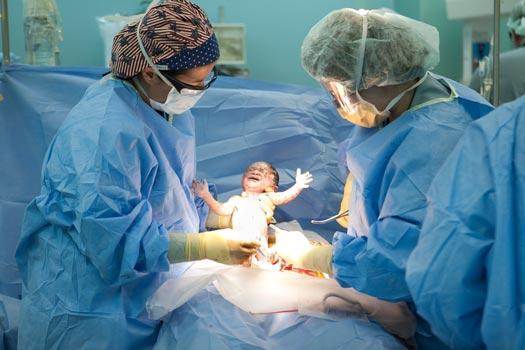A Caesarean section (C-section) may be recommended for various medical reasons to ensure the safety of both the mother and the baby. Some common situations where a C-section might be recommended include:
-
Failure to Progress in Labor: If labor is not progressing, and the cervix is not dilating adequately, a C-section may be recommended to avoid complications.
-
Fetal Distress: Signs of distress in the baby, such as an abnormal heart rate or meconium staining, may prompt the need for a C-section to ensure a swift and safe delivery.
-
Breech Presentation: If the baby is in a breech (bottom-first) or transverse position, a C-section may be recommended, as delivering a breech baby vaginally poses increased risks.
-
Placenta Previa: When the placenta partially or completely covers the cervix, a condition known as placenta previa, a C-section is typically recommended to avoid bleeding complications.
-
Multiple Pregnancies: C-sections are often recommended for women carrying twins, triplets, or higher-order multiples due to increased complexity and potential risks during delivery.
-
Previous C-section (Repeat C-section): If a woman has had a previous C-section, a repeat C-section may be recommended in subsequent pregnancies, although vaginal birth after C-section (VBAC) is often considered in certain cases.
-
Maternal Health Concerns: Conditions such as preeclampsia, heart disease, or active genital herpes may increase the risk of complications during vaginal delivery, making a C-section the safer option.
-
Cord Prolapse: If the umbilical cord slips through the cervix ahead of the baby (cord prolapse), it can become compressed during labor, necessitating a C-section for a quicker delivery.
-
Uterine Rupture: In women who have had a previous C-section, there is a risk of uterine rupture during labor, especially if attempting a VBAC. In such cases, an emergency C-section may be required.
-
Large Baby (Macrosomia): If the baby is estimated to be unusually large (macrosomia), a C-section may be recommended to prevent complications associated with shoulder dystocia.
-
Certain Medical Conditions: Conditions like active genital herpes, HIV, or maternal infections that could be transmitted to the baby during a vaginal delivery may warrant a C-section.
It's important to note that the decision to perform a C-section is often made collaboratively between the healthcare provider and the expectant mother, considering the individual circumstances and preferences. Additionally, emergency C-sections may be performed in situations that arise suddenly during labor and pose a threat to the well-being of the mother or baby.
Empower your health with personalized care from Dr. Deepika Doshi, a dedicated gynecologist committed to providing comprehensive women's health services. Whether you seek routine gynecological care, family planning advice, or specialized consultations, Dr. Doshi is your trusted partner. As a leading Gynecologist in Mira Road, she blends expertise with compassion to address your unique healthcare needs.

